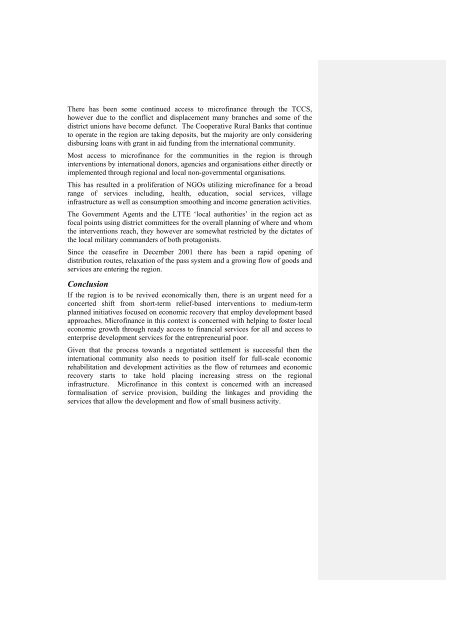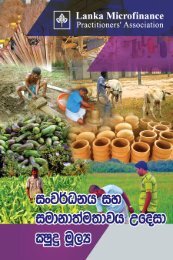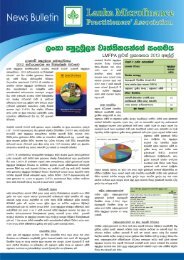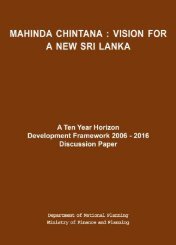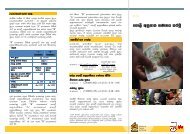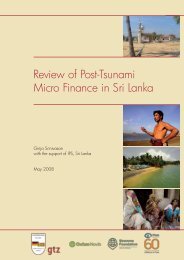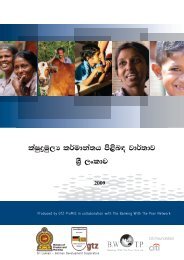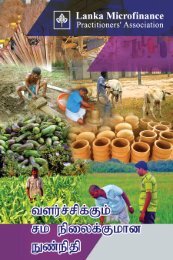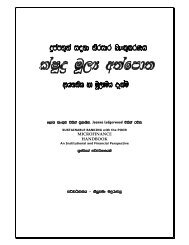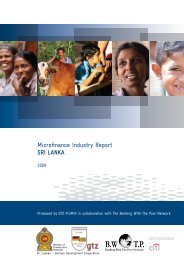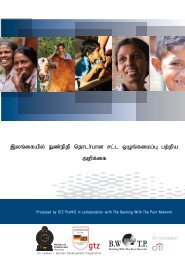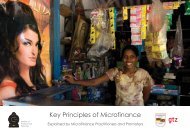National Microfinance Study of Sri Lanka: Survey of Practices and ...
National Microfinance Study of Sri Lanka: Survey of Practices and ...
National Microfinance Study of Sri Lanka: Survey of Practices and ...
Create successful ePaper yourself
Turn your PDF publications into a flip-book with our unique Google optimized e-Paper software.
There has been some continued access to micr<strong>of</strong>inance through the TCCS,<br />
however due to the conflict <strong>and</strong> displacement many branches <strong>and</strong> some <strong>of</strong> the<br />
district unions have become defunct. The Cooperative Rural Banks that continue<br />
to operate in the region are taking deposits, but the majority are only considering<br />
disbursing loans with grant in aid funding from the international community.<br />
Most access to micr<strong>of</strong>inance for the communities in the region is through<br />
interventions by international donors, agencies <strong>and</strong> organisations either directly or<br />
implemented through regional <strong>and</strong> local non-governmental organisations.<br />
This has resulted in a proliferation <strong>of</strong> NGOs utilizing micr<strong>of</strong>inance for a broad<br />
range <strong>of</strong> services including, health, education, social services, village<br />
infrastructure as well as consumption smoothing <strong>and</strong> income generation activities.<br />
The Government Agents <strong>and</strong> the LTTE ‘local authorities’ in the region act as<br />
focal points using district committees for the overall planning <strong>of</strong> where <strong>and</strong> whom<br />
the interventions reach, they however are somewhat restricted by the dictates <strong>of</strong><br />
the local military comm<strong>and</strong>ers <strong>of</strong> both protagonists.<br />
Since the ceasefire in December 2001 there has been a rapid opening <strong>of</strong><br />
distribution routes, relaxation <strong>of</strong> the pass system <strong>and</strong> a growing flow <strong>of</strong> goods <strong>and</strong><br />
services are entering the region.<br />
Conclusion<br />
If the region is to be revived economically then, there is an urgent need for a<br />
concerted shift from short-term relief-based interventions to medium-term<br />
planned initiatives focused on economic recovery that employ development based<br />
approaches. <strong>Micr<strong>of</strong>inance</strong> in this context is concerned with helping to foster local<br />
economic growth through ready access to financial services for all <strong>and</strong> access to<br />
enterprise development services for the entrepreneurial poor.<br />
Given that the process towards a negotiated settlement is successful then the<br />
international community also needs to position itself for full-scale economic<br />
rehabilitation <strong>and</strong> development activities as the flow <strong>of</strong> returnees <strong>and</strong> economic<br />
recovery starts to take hold placing increasing stress on the regional<br />
infrastructure. <strong>Micr<strong>of</strong>inance</strong> in this context is concerned with an increased<br />
formalisation <strong>of</strong> service provision, building the linkages <strong>and</strong> providing the<br />
services that allow the development <strong>and</strong> flow <strong>of</strong> small business activity.


